The Center for Black Literature, National Black Writers Conference (NBWC) at Medger Evers College, under the direction of Dr. Brenda M. Greene held its Biennial Symposium: Voices of Liberation and Resistance and a Tribute to Danny Glover on Saturday, March 28. The event was well attended and held in Medger Evers Founders Auditorium.
After a welcome by Kierna Mayo, VP, Digital Content, Ebony.com, student Christian Ademola Lewis, Dr. Augustine Okereke, provost, Medger Evers College, and Dr. Brenda M. Greene, NBWC director, executive director, Center for Black Literature. Before the speeches and panels got underway, the audience was treated to a performance by the dance company, Something Positive, which was a dance company in residence at Medger Evers College when the company’s founder and director, now deceased was part of the faculty.
Dr. Haki Madhubuti, publisher, Third World Press introduced Danny Glover who gave the keynote address, but before Glover delivered the keynote address he was presented with Proclamations from the United States Congress by Representative Yvette Clarke, and one from the New York City Council by Council Members Inez Barron and Laurie Cumbo. Glover was also given an award from Medger Evers College, presented by Dr. Brenda M. Greene, all for his distinguished career as a major motion picture actor, humanitarian and activist.
In Glover’s address he spoke about the importance of making moral choices and conscious philanthropy that support good for the community at large, as well as support for institution and projects that have positive and uplifting goals. He credits Paul Robeson as being one of his primary mentors. His focus was that of activism, liberation and resistance in the arts. He cofounded Louverture Films in 2005 to develop and produce films of historical relevance, social purpose, commercial value and artistic integrity. He has a long history of using his success in the motion picture industry and artistic expression as a platform for instilling social awareness and action in individuals and communities. Glover is known for his wide-reaching community activism and philanthropic efforts, with particular emphasis on advocacy for economic justice, access to health care and education. He has a record of addressing issues of economic development and poverty in Africa, the Caribbean, and Latin America.
After the keynote address Glover and Haki Madhubuti sat down and continued a discussion of the same topic, during which Madhubuti revealed that Glover had saved his publishing company, Third World Press from demise through his philanthropy. There was a Q&A session, which followed, and members of the audience were able to address questions to Glover and Madhubuti.
Due to the exuberance of the discussion by Glover and Madhubuti, the morning session ran over. That made for the need of someone to take charge of the afternoon session with a strong hand and sharp blade to guide the rest of the program. Dr. Lindamichelle Baron, the program MC met the challenge beautifully. Dr. Baron is a former New York City public school teacher and the present chair of the Department of Teacher Education at York College (CUNY) in Publications. She exercised her considerable experience and sense of humor as she wrangled the speakers and entertained the audience between stage set ups.
A screening of “The Black Power Mixtape 1967-1975,” which Danny Glover is one of the producers lead off the afternoon session, followed by a discussion of the film with Jamal Joseph and Randall Horton. The film offers a fresh view of the Black Power Movement, as it is a documentary made by Swedish filmmakers, a view from afar. Featured in the film are Stokely Carmichael and Angel Davis, and the voices of Erykah Badu, Talib Kweli, Abiodun Oyewole, and Questlove.
Dr. Greg Carr, associate professor of Africana Studies and chair of the Department Afro-American Studies at Howard University talked about designing the curriculum framework for Philadelphia’s Freedom Schools and teaching at Howard University’s Law School. A panel with Rashidah Ismali Abubakr, Bridgett Davis and David Henderson followed with a discussion on politics, cultural and the Umbra Movement. Authors: Sapphire and Jacqueline Woodson read selected passages from their work, and the session concluded with a music and poetry performance by “Heroes Are Gang Leaders,” which was dedicated to the memory of Amiri Baraka.
After the symposium, the audience and participants adjourned to the newly constructed Welcome Center for a reception, where they socialized and enjoyed refreshments and conversation.
Copyright: 2015 Ankhra House, Ltd.

























